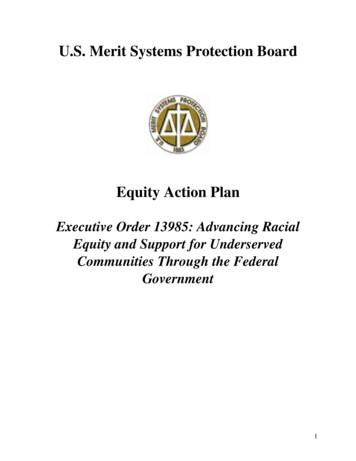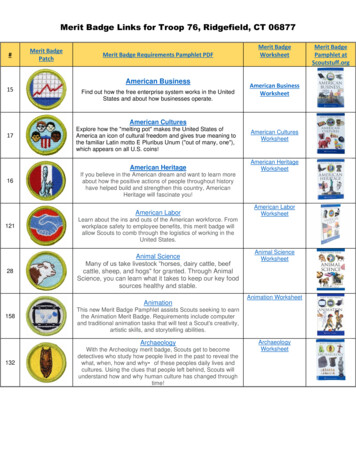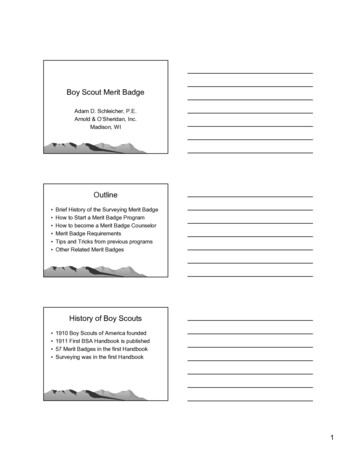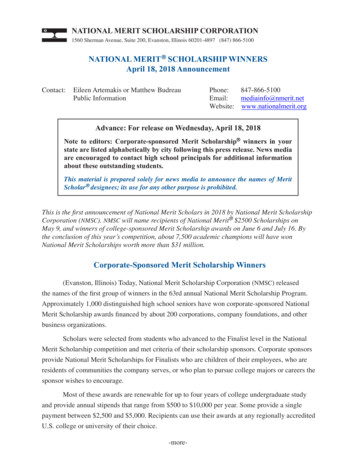
Transcription
U.S. Merit Systems Protection BoardEquity Action PlanExecutive Order 13985: Advancing RacialEquity and Support for UnderservedCommunities Through the FederalGovernment1
Executive SummaryBackground & Mission: The U.S. Merit Systems Protection Board (MSPB) was established bythe Civil Service Reform Act of 1978, Public Law 95-454. It is an independent, quasi-judicialagency of the executive branch that protects the Federal merit systems. MSPB carries out itsstatutory authority and responsibility by (1) adjudicating appeals filed by employees, applicants,and annuitants; (2) conducting Federal merit system studies; and (3) providing an independent,nonpartisan review of the significant actions and regulations of the Office of PersonnelManagement (OPM) to ensure these actions conform with merit system principles (MSPs) anddo not result in prohibited personnel practices (PPPs).Adjudication is the agency’s most resource-intensive function and the process with the broadesteffect on equity and accessibility. Adjudication includes processing the following appeal types:appeals of adverse personnel actions involving Federal agencies and their employees; contesteddeterminations by OPM affecting individuals’ rights and interests under the Civil ServiceRetirement System or the Federal Employees Retirement System; challenges from applicants foremployment who believe an employment practice has been applied to them that violates a basicrequirement in 5 CFR § 300.103; veterans claiming their preference rights have been violatedduring the hiring process, citing anti-veteran discrimination or failure to restore based on theirmilitary status; and appeals from purported whistleblowers.How MSPB is Unique: MSPB serves appellants from all segments of society, includingindividuals who belong to underserved communities that have been denied equitable treatment,such as Black, Latino, and Indigenous and Native American persons, Asian Americans andPacific Islanders, and other persons of color; members of religious minorities; lesbian, gay,bisexual, transgender, and queer (LGBTQ ) persons; persons with disabilities; persons who livein rural areas; and persons otherwise adversely affected by persistent poverty or inequality.However, MSPB does not directly serve the general public in the traditional sense. Federalemployees, annuitants, veterans, and purported whistleblowers in the Federal workplace must optto challenge actions and decisions effected by other Federal agencies, sometimes afterexhausting administrative remedies elsewhere. The adjudication process is not automatic, andappellants, having been advised of their rights and provided MSPB contact information andinstructions, seek to challenge another agency’s actions or decisions. This is a way in whichMSPB differs from typical Federal agencies: MSPB cannot predict which persons among theFederal workforce, Federal annuitants, veterans, or applicants for Federal employment willrequest its services or to target for outreach. MSPB effectively is the last stop in severalprocesses out of its own control, and the other agencies handling those processes that potentiallybring appellants to MSPB are required by regulation to inform them about their appeal rights andgive them MSPB’s contact information. National advertisement, outreach, and broad promotionof MSPB’s unique role and function is not an effective way to ensure that the persons who mayneed the agency’s services are aware of them, unlike more well-known Federal functions,services, and roles.The population of persons MSPB serves overall may be relatively small, but the avenue forpotential redress of adverse agency decisions is particularly important to Federal employees,Federal annuitants and their dependents, veterans, and applicants for Federal employment. Many2
Federal employees allege discriminatory animus on Title VII or Rehabilitation Act bases as areason behind the personnel actions they are appealing. Many annuitants and persons challengingbenefits determinations by OPM are elderly, live in rural areas, and may have little formaleducation, and some of them are not Federal employees themselves, but rather spouses andchildren of deceased or incapacitated Federal employees and veterans. The limited populationeligible for, and in need of, adjudicatory services relies on MSPB as the recourse for review ofdecisions that threaten their livelihood. If MSPB did not exist, Federal agencies could effectadverse actions without an oversight authority to prevent abuses, PPPs, and whistleblowerreprisal. Considering MSPB’s small size and budget, it provides outsized value to the Federalworkforce, Federal agencies, and the American taxpayer. MSPB’s effective and efficientadjudication of appeals, enforcement of its decisions, objective merit systems studies, and reviewof OPM regulations and significant actions adds value and saves money by improving the qualityof the workforce providing services to the public, strengthening adherence to MSPs, andpreventing PPPs.Our Approach to Equity: Since MSPB is not seeking to increase appeals activity generally—asmost persons in the United States do not have standing and do not need to file these types ofappeals in the first place—our equity model is instead to (1) look inwardly at the adjudicationpolicies, processes, and internal training to minimize unconscious bias on the part of employeescarrying out MSPB’s mission; (2) improve communication with appellants and the Federalworkforce; (3) remove accessibility barriers for persons with disabilities; and (4) mitigatebarriers for persons potentially without internet access, without higher education, and potentiallywithout financial resources (including personal time) to expend on the appeals process.Summary of Early Efforts & AccomplishmentsOriginally, MSPB planned to perform statistical analyses to measure equity regarding the rates ofpersons from potentially underserved communities requesting adjudication of adverse personnelactions and thereby assess baseline equity measures in adjudication outcomes. The goal of suchanalyses would be to ensure that certain groups are not consistently opting out of the appealsprocess, abandoning it at rates higher than other groups, or prevailing in their appeals at rates thatfall below statistically probable levels. However, the lack of record-level, demographic datamakes such relational analyses impossible. Until there is a collection vehicle1 for the fullspectrum of demographic data from customers and at least few years of data to analyze,statistical analyses remain out of reach. MSPB included a suggestion in its 90-Day Equity Planthat OPM and OMB develop a survey collection tool for such data. However, the EqualEmployment Opportunity Commission (EEOC) has since indicated that this type of effort is nowunderway among EEOC, OPM, and OMB; therefore, MSPB has removed that recommendationfrom its plan. Ordinarily, agencies start with an extensive body of data for analysis, and forMSPB, this would not just be descriptive data about our appellants, but other important data1MSPB, like other agencies, is challenged by the lack of a standardized, comprehensive demographic survey toolapproved by the Office of Management and Budget (OMB)—a form comparable to Standard Forms 181, “Ethnicityand Race Identification,” and 256, “Self-Identification of Disability”—that includes diversity and inclusioncategories in addition to those on the aforementioned Standard Forms, i.e., religion, (specific) national origin, sexualorientation, gender identification, and community type (for statistical socioeconomic/area designation to identifyurban, suburban, and rural communities, using census code designations rather than creating a new system).3
sources associated with that demographic data (e.g., survey results, focus group trends, etc.) tocross-tabulate against descriptive data variables, or comparable agencies’ bodies of data andbarrier analysis conclusions, or any other quantitative information. That body of data is thestarting place for meaningful, fact-based barrier analysis.Since then, MSPB participated in several OMB-sponsored roundtable discussions and has takenup various additional ideas for equity initiatives. As a direct result, MSPB replaced the plan forstatistical analyses with a plan to proceed directly to unconscious bias, cultural sensitivity, anddisability etiquette training for administrative judges, general attorneys, and paralegals involvedin adjudication processes to minimize potential, attitudinal barriers from which, like everyoneelse, we are not immune. Since we are unable to point to statistical triggers that indicate anyinequity in outcomes of appeal processes, we are left with speculation about potential barriersthat might exist, and among the three types of barriers typically defined for the purpose of civilrights analyses (institutional or structural, attitudinal, and physical), attitudinal barriers are themost difficult to diagnose or prove. Direct evidence is rare. Attitudinal barriers involve anyactions or beliefs that are not stated, obvious, or quantifiable. Lacking any data related to theequity groups defined in Executive Order (EO) 13985, the agency recognized that unconsciousbias, cultural sensitivity, and disability etiquette training has not been widely offered or requiredfor employees. MSPB is now following best-practice advice related to ensuring that all personsin the agency are aware that implicit biases can exist. These biases can affect not just outcomesof any type of process or Government service, but also affect the perceptions of the personsserved—not just about the agency providing the service, but about the Federal Governmentgenerally. Two disability etiquette training sessions have already taken place, and two-thirds ofthe agency attended. The third session will take place in March 2022. Also, our initial equityassessment focused primarily on the readability and electronic accessibility of MSPB’s onlineresources rather than a comprehensive vetting of them to update our website content, andMSPB’s Equity Team has broadened the focus. This effort will help ensure that the most currentcase law relevant to persons of color, LGBTQ persons, and persons with disabilities is reflectedin the resources available to appellants on MSPB’s public website.The January 2021 Presidential Memorandum on “Tribal Consultation and Strengthening Nationto-Nation Relationships” also reinforced our decision to add cultural sensitivity and unconsciousbias training to the agency’s Equity Action Plan. MSPB conducts hearings on issues relevant topersons in American Indian tribes and interacts with witnesses who are indigenous persons. InAugust, the Chief Administrative Judge in our Denver Field Office attended a Federal ExecutiveBoard Tribal Affairs Panel discussion on tribal consultation and other topics. The panelistsincluded Federal employees from various agencies engaged in tribal programming, and the eventwas educational and prompted additional ideas for us. For example, we will consider developinga tribal outreach or consultation policy and consulting with Tribal Nations on their civil servicesystems, where they may exist or if they are interested in establishing them.MSPB has a longstanding policy and practice of offering draft copies of the Board’s strategicplans to external stakeholders. We identified approximately 70 entities that are consistentparticipants and interest groups in MSPB appeals and merit studies or are otherwise nationalpartners with shared interests in upholding merit principles and human capital, civil rights, andwhistleblower laws and policies. These stakeholders are typically provided with a copy of the4
plan and given an opportunity to make suggestions and communicate their viewpoints andcurrent concerns to the agency during the drafting process. During the last cycle, the agency’sPerformance Improvement Officer (PIO) asked stakeholders to provide perceptions about theagency’s strengths and weaknesses, etc., and a new Strategic Plan for Fiscal Year (FY) 20222026 was created with that input. MSPB focused on affinity groups and experts to provide inputon strategic goals, priorities, performance metrics, etc. Included were groups such as Blacks inGovernment, Disabled American Veterans, Federal Asian Pacific Affinity Council, and theSociety of American Indian Government Employees (SAIGE). MSPB involved its EEO Directorin expanding the current list of stakeholders, and its PIO and EEO Director are planning to invitesome affinity groups to meet with MSPB and discuss our strategic and equity plans in 2022.Equity Action Plan Elements#1: Program/policy: Appeals Adjudication—Equitable TreatmentMSPB is reviewing its adjudicatory function to identify the potential for inequity in the appealsprocess, to help ensure that all Federal employees and others with appeal rights are servedwithout bias, including individuals who belong to underserved communities , such as Black,Latino, and Indigenous and Native American persons, Asian Americans and Pacific Islandersand other persons of color; members of religious minorities; LGBTQ persons; persons withdisabilities; persons who live in rural areas; and persons otherwise adversely affected bypersistent poverty or inequality. MSPB employees involved with adjudication require consistenttraining about potential barriers to equal opportunity for persons in these groups, barriers whichmay lessen the quality of their customer experience and unwittingly affect their outcomes in theprocess. MSPB’s adjudication function intersects with numerous other Federal agencies and theircomponents that are parties to appeals, and in certain appeals, the Board’s work intersects withthe work of the Office of Special Counsel (OSC), OPM, EEOC, the Department of Justice(DOJ), and Federal courts. Absent issuing corrective action after adjudication, MSPB has little, ifany, control over the actions of employees at other agencies and the adverse decisions issued bythese other Federal agencies. Therefore, MSPB is only able to assess its own potential barriers toequity. In the absence of data to indicate that attitudinal barriers may potentially exist, we willincrease the variety and frequency of civil rights training internally.The decision to focus on unconscious bias and cultural sensitivity also was a consideration basedon the Presidential Memorandum on “Tribal Consultation and Strengthening Nation-to-NationRelationships.” MSPB conducts hearings on issues relevant to persons in American Indian tribesand interacts with witnesses who are indigenous persons; therefore, ensuring effectivecommunication and minimizing bias is a key equity concern in these matters.Action 1: To mitigate potential, attitudinal barriers to equity, MSPB is adding a requirement forperiodic unconscious bias, cultural sensitivity, and disability etiquette training for administrativejudges, general attorneys, and paralegals involved in adjudication processes. Moreover, thistraining is open to all MSPB employees. Two disability etiquette training sessions have alreadytaken place, and two-thirds of the agency attended. The third session will take place in March2022. MSPB’s goal is to provide sessions of unconscious bias, sensitivity, and etiquette trainingannually, with more than 85% of employees participating. The EEO Director will take5
responsibility for ensuring that the goal is met, with MSPB’s regional and field offices andheadquarters employees involved in planning and execution.Action 2: We will explore the ways we interact with Tribal Nations and how we can be moresupportive of them in our work. For example, we will consider how our outreach efforts onMSPB’s mission and processes could be extended to tribal communities and to include tribalconsultation, and a Chief Administrative Judge will be responsible for briefing recommendationsto MSPB’s Equity Team by September 1, 2022. We also will screen agency actions for potentialtribal implications. Finally, we contacted SAIGE for stakeholder input as part of our currentstrategic planning process, and we will schedule meetings with them and other affinity groups todiscuss these issues and outreach opportunities.Action 3: The EEO Director added a question to the agency’s exit interview survey to offerdeparting employees an opportunity to comment on the extent to which they believe MSPB isserving appellants from all segments of society, especially those historically underserved. On anongoing basis, feedback regarding the agency’s performance serving its customers will be part ofroutine analyses and briefings, as trends may become evident.#2: Program/policy: Appeals Adjudication—AccessibilityMSPB is reviewing its adjudicatory function to identify and improve, wherever needed, access inthe appeals process. This will help ensure that all Federal employees and others with appealrights, regardless of demographic factors, are aware of and avail themselves of the appealprocess if they are eligible to do so, particularly including individuals who belong to historicallyunderserved communities, such as Black, Latino, and Indigenous and Native American persons,Asian Americans and Pacific Islanders and other persons of color; members of religiousminorities; LGBTQ persons; persons with disabilities; persons who live in rural areas; andpersons otherwise adversely affected by persistent poverty or inequality. Persons in thesepopulations may not be availing themselves of the appeal process; or, when they do so, barriersto equal opportunity to participate may exist which may lessen the quality of their customerexperience and may unwittingly affect their outcomes in the process. MSPB’s adjudicationfunction intersects with numerous other Federal agencies and their components that are parties toappeals, and in certain appeals, the Board’s work intersects with the work of OSC, OPM, EEOC,DOJ, and Federal courts.Action 1: MSPB is examining all elements of the appeals process to eliminate barriers such asunnecessarily complicated or unclear instructions for filing appeals and in routine issuances,inaccurate or outdated online resources, a complaints process (for appellants to seek review oftheir appeal experiences) that may need more clarity, and long-needed modernization of coreadjudication applications (which is underway but not yet implemented).The greatest hindrance to data-driven approaches to MSPB’s Equity Action Plan is the dearth ofrecord-level demographic data. Such data does not exist for statistical analyses to detect adverseimpact on specific demographic groups. The agency was able to assess the types of appeals thatcome before it, and to determine that although it is possible to make certain demographicconclusions about appellants based on appeal type—for example, appeals filed by veterans andannuitants are likely filed by persons who are older, socioeconomically disadvantaged, or have6
disabilities as compared to other appellant groups—record-level information to associate specificdemographic information with individual appeals for the vast majority of appeals does not exist.Action 2: MSPB will follow the progress of EEOC, OPM, and OMB in their development of anapproved tool to survey appellants for demographic information. Specific metrics and baselinegoals related to survey responses will be developed. Similarly, metrics related to process analysiswill be developed, once record-level data pools are sufficient for detection of adverse impact onfocal groups as compared with majority groups—for example, when it is possible to determinewhether low-income, older, or less-highly-educated appellants abandon the process at earlierstages than appellants in other groups, or whether appellants in historically underservedcommunities express dissatisfaction with the appeal process at rates that are out of step withmajority groups to a statistically significant extent.MSPB is assessing alternate means of determining where accessibility barriers to equalparticipation may lie. Coincident to this planning process, the agency recently launched a newpublic website. The layout follows the General Services Administration’s (GSA) structuredeveloped with participation and guidance from the Access Board and Section 508 Communityof Practice. This redesign ensures a more accessible, easily navigated experience for users withvision and dexterity disabilities. In June and July 2021, administrative judges in MSPB’sregional and field offices reviewed the agency’s online descriptions of the MSPs and the PPPsand revised them where they were outdated. For example, pre-Bostock references to differencesin theories of discrimination and alternative processes were updated, which is helpful toLGBTQ persons.While emphasizing electronic filing and online resources in the adjudication of appeals, MSPBmust remain vigilant in observing plain language principles and guidelines when providingonline instructions. The agency receives most of its appeals electronically, through its e-AppealOnline system. Appellants are not required to compile and submit paper copies of documents ormail letters. Given the nature of MSPB’s work we do not have a specific Limited EnglishProficiency (or LEP) program, because the agency almost never serves people who do not speakEnglish fluently enough to participate. English fluency is a requirement for Federal employmentand the armed services. For the rare occasions MSPB deals with the family members of adeceased or incapacitated Federal employee who may not speak English, the MSPB AJ’shandbook contains a protocol for procuring translation for documents and hearings, in its“Foreign Languages” section.Action 3: The agency is committing to fully reviewing our website’s adjudication content bySeptember 30, 2022. Also, a forthcoming webpage will include guidance more clearlyarticulating how the agency addresses allegations of bias during the appeals process and willprovide step-by-step information about how to register a complaint. In FY 2020, MSPBdemonstrated its commitment to serving persons with disabilities by creating a new position andhiring its first Accessibility Program Manager. Fortifying MSPB’s Section 508 compliance andprogram accessibility was necessary to have its policies and procedures better reflect theagency’s profile, mission, and culture. This individual works principally on external civil rightsmatters.7
Action 4: A draft of an entirely new policy and procedure, for conducting accessibility reviewsrelated to electronic and information technology is currently circulating for comments. Theagency uses the Department of Homeland Security’s “Trusted Tester” framework as a tool forassessing compliance of electronic and information technology with Section 508 and hasdiscussed the need to develop a method by which external accommodations for appellants will betracked more closely. The Accessibility Program Manager is also involved in reviewing andtesting our new adjudication application as it is being developed to ensure that accessibilityconsiderations and requirements are incorporated along the way. Ongoing guidance andconsultation are provided by the Accessibility Program Manager to adjudicatory staff to ensureongoing efforts to accommodate persons with disabilities. Further agency guidance and supportwill be issued in 2022.#3: Program/policy: Appeals Adjudication—Internal Equity to Support External EquityMSPB is looking at internal equity to support external equity. EEOC Management Directive(MD) 715 reports indicate that MSPB is employing persons in EEOC’s defined demographicgroups in numbers approximating their employment availability in our country. However, thegoal of EO 13985 goes beyond ensuring that agencies are not potentially violating civil rightslaws; it promotes the goal of having agencies more closely resemble American society overall.MSPB’s initiatives incorporate elements of EO 14035, “Diversity, Equity, Inclusion, andAccessibility in the Federal Workforce,” so that the agency’s compliance efforts for both EOscomplement one another wherever possible. The agency’s MD-715 conclusions indicate nointernal barriers for employees, but two external barriers (non-EEO; non-civil rights barriers)exist in that (1) white men have the highest employment availability in the nation in the attorneyfield, and (2) because half of the agency’s employees are in Washington, D.C., rather thanequally spread throughout the country, most of its own demographic employment availability isbased in one of the most expensive locations.Action 1: MSPB is committing to advertising vacancies with minority bar associations moreeffectively, to ensure that appellants will have the opportunity to engage with a diverse cohort ofadministrative judges and to build trust in the adjudication process and outcomes.#4: Program/policy: Procurement/Purchasing/ContractingOur review of MSPB’s purchasing policies and practices was not a fruitful area for equityassessment and identification of barriers. The agency’s established procurement policies andprocedures follow current requirements in the Federal Acquisition Regulation (FAR), to whichall agencies must adhere. MSPB does not conduct extensive purchasing of supplies and furniturethat other, larger agencies require to maintain operations. MSPB does not administer grants anddoes not produce measurable/significant excess property and electronics for donation. Therefore,considering these facts, we conclude there are no discernible barriers here.MSPB’s primary source for supplies (after assessing on-hand stock and inventory) is GSAAdvantage. GSA Advantage is structured to prioritize and present search results fromdisadvantaged, minority, women-owned, and disability-staffed businesses. For services, MSPB isrequired to assess those on the procurement list maintained by the “Committee for Purchase from8
People Who Are Blind or Severely Disabled.” Commercial sources located by other, FARrequired means also prioritize results for disadvantaged businesses. MSPB’s EEO Office, forexample, located its contractor for EEO investigations in this manner, and the contract is fulfilledby a women-owned, small business in the Midwest, in an economically depressed statistical area.If MSPB identifies any significant procurement opportunities, equity priorities will beconsidered.ConclusionPersons throughout the MSPB workforce are eager to participate in these Action Plan activities,and we anticipate positive feedback from our employees given the strong message of theagency’s commitment to equity as evidenced by this assessment and planning process. As forany discernible, “immediate, tangible improvements in people’s lives that [we] anticipate,” nowidespread societal impacts are evident, since the agency’s primary mission is already sooriented to inclusion, diversity, equity, civil rights, and compliance principles. Our efforts to dateand plans going forward to implement additional employee training, reach out to affinity groups,obtain feedback from our employees, update the adjudication content on MSPB’s website, makestandard orders and documents more accessible, establish a more comprehensive AccessibilityProgram, broaden the reach of our vacancy announcements, and continuing to look for ways tostatistically measure potential inequities, are the agency’s most immediate and far-reaching.9
Adjudication is the agency's most resource-intensive function and the process with the broadest effect on equity and accessibility. Adjudication includes processing the following appeal types: . bring appellants to MSPB are required by regulation to inform them about their appeal rights and give them MSPB's contact information. National .











